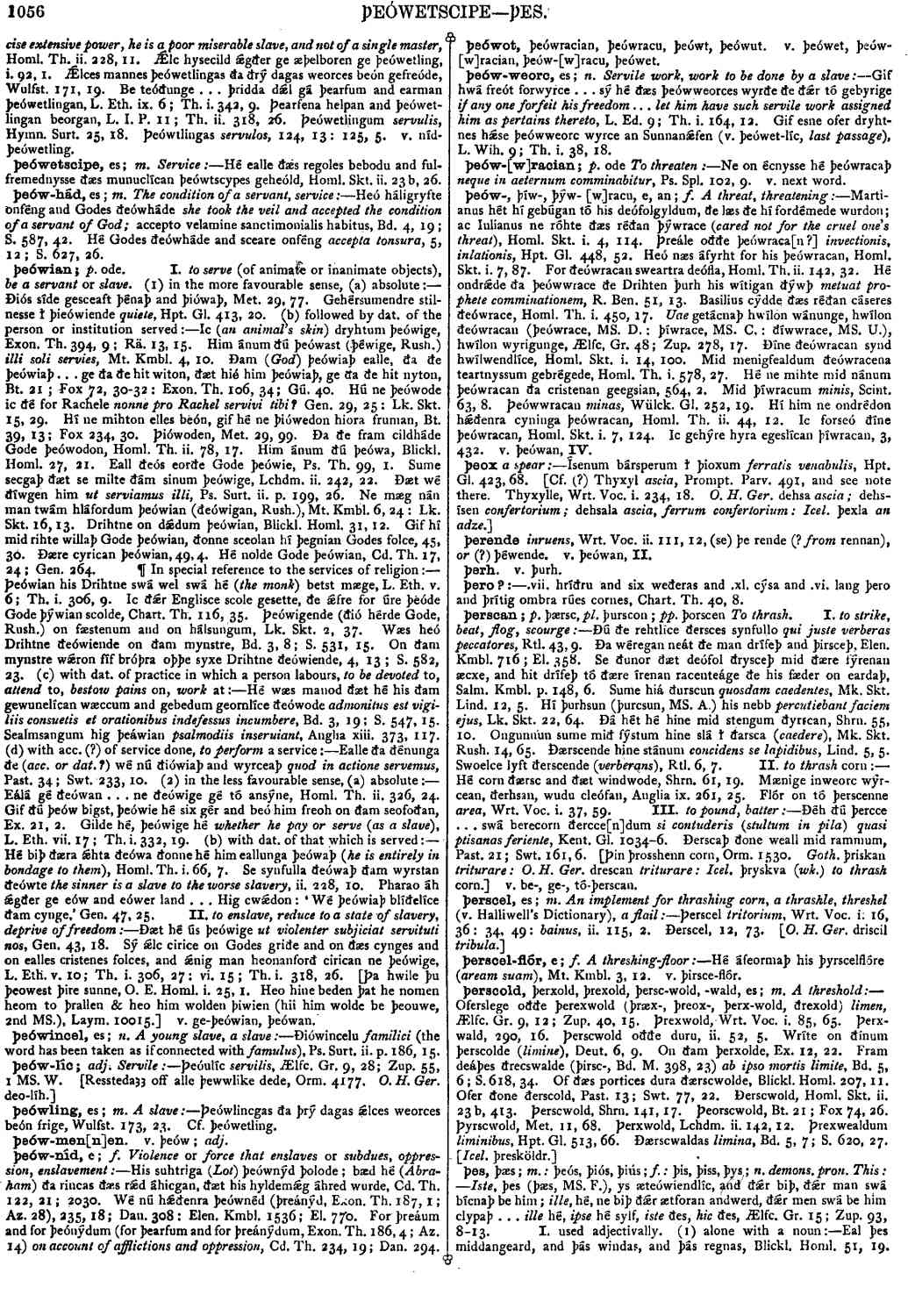þeówian
- verb [ weak ]
-
Ðiós síde gesceaft þénaþ and þiówaþ,
- Met. 29, 77.
-
Gehérsumendre stilnesse ł þieówiende
quiete,
- Hpt. Gl. 413, 20.
-
Ic (
an animal's skin
) dryhtunt þeówige,- Exon. Th. 394, 9; Rä. 13, 15.
-
Him ánum ðú þeówast (þéwige, Rush.)
illi soli servies,
- Mt. Kmbl. 4, 10.
-
Ðam (
God
) þeówiaþ ealle, ða ðe þeówiaþ ... ge ða ðe hit witon, ðæt hié him þeówiaþ, ge ða ðe hit nyton,- Bt. 21; Fox
72, 30-32: Exon. Th. 106, 34; Gú. 40.
-
Hú ne þeówode ic ðe for Rachele
nonne pro Rachel servivi tibi?
- Gen. 29, 25: Lk. Skt. 15, 29.
-
Hí ne mihton elles béón, gif hé ne þiówedon hiora fruman,
- Bt. 39, 13; Fox 234, 30.
-
Þiówoden,
- Met. 29, 99.
-
Ða ðe fram cildháde Gode þeówodon,
- Homl. Th. ii. 78, 17.
-
Him ánum ðú þeówa,
- Blickl. Homl. 27, 21.
-
Eall ðeós eorðe Gode þeówie,
- Ps. Th. 99, 1.
-
Sume secgaþ ðæt se milte ðám sinum þeówige,
- Lchdm. ii. 242, 22.
-
Ðæt wé ðíwgen him
ut serviamus illi,
- Ps. Surt. ii. p. 199, 26.
-
Ne mæg nán man twám hláfordum þeówian (ðeówigan,
- Rush.), Mt. Kmbl. 6, 24: Lk. Skt. 16, 13.
-
Drihtne on dǽdum þeówian,
- Blickl. Homl. 31, 12.
-
Gif hí mid rihte willaþ Gode þeówian, ðonne sceolan hí þegnian Godes folce,
- 45, 36.
-
Ðære cyrican þeówian,
- 49, 4.
-
Hé nolde Gode þeówian, Cd. Th.17, 24; Gen. 264. ¶ In special reference to the services of religion :-- Þeówian his Drihtne swá wel swá hé (
the monk
) betst mæge,- L. Eth. v.
6; Th. i. 306, 9.
-
Ic ðǽr Englisce scole gesette, ðe ǽfre for úre þeóde Gode þýwian scolde,
- Chart. Th. 116, 35.
-
Þeówigende (ðió hérde Gode,
- Rush.) on
-
Wæs heó Drihtne ðeówiende on ðam mynstre,
- Bd. 3, 8; S. 531, 15.
-
On ðam mynstre wǽron fif bróþra oþþe syxe Drihtne ðeówiende,
- 4, 13; S. 582, 23.
-
Hé wæs manod ðæt hé his ðam gewunelícan wæccum and gebedum geornlíce ðeówode
admonitus est vigiliis consuetis et orationibus indefessus incumbere,
- Bd. 3, 19; S. 547, 55.
-
Sealmsangum hig þeówian
psalmodiis inseruiant,
Anglia xiii.- 373, 117.
-
Ealle ða ðénunga ðe (acc. or dat.?) wé nú ðiówiaþ and wyrceaþ
quod in actione servemus,
- Past. 34; Swt. 233, 10.
-
Eálá gé ðeówan ... ne ðeówige gé tó ansýne,
- Homl. Th. ii, 326, 24.
-
Gif ðú þeów bigst, þeówie hé six gér and beó him freoh on ðam seofoðan,
- Ex. 21, 2.
-
Gilde hé, þeówige hé
whether he pay or serve (as a slave),
- L. Eth. vii. 17; Th. i. 332, 19.
-
Hé biþ ðæra ǽhta ðeówa ðonne hé him eallunga þeówaþ (
he is entirely in bondage to them
),- Homl. Th. i. 66, 7.
-
Se synfulla ðeówaþ ðam wyrstan ðeówte
the sinner is a slave to the worse slavery,
ii.- 228, 10.
- Pharao áh ǽgðer ge eów and eówer land ... Hig cwǽdon: 'Wé þeówiaþ blíðelíce ðam cynge,' Gen. 47, 25.
-
Ðæt hé ús þeówige
ut violenter subjiciat servituti nos,
- Gen. 43, 18.
-
Sý ǽlc cirice on Godes griðe and on ðæs cynges and on ealles cristenes folces, and ǽnig man heonanforð cirican ne þeówige,
- L. Eth. v. 10; Th. i. 306, 27. vi. 15; Th. i. 318, 26.
Bosworth, Joseph. “þeówian.” In An Anglo-Saxon Dictionary Online, edited by Thomas Northcote Toller, Christ Sean, and Ondřej Tichy. Prague: Faculty of Arts, Charles University, 2014. https://bosworthtoller.com/31795.
Checked: 0